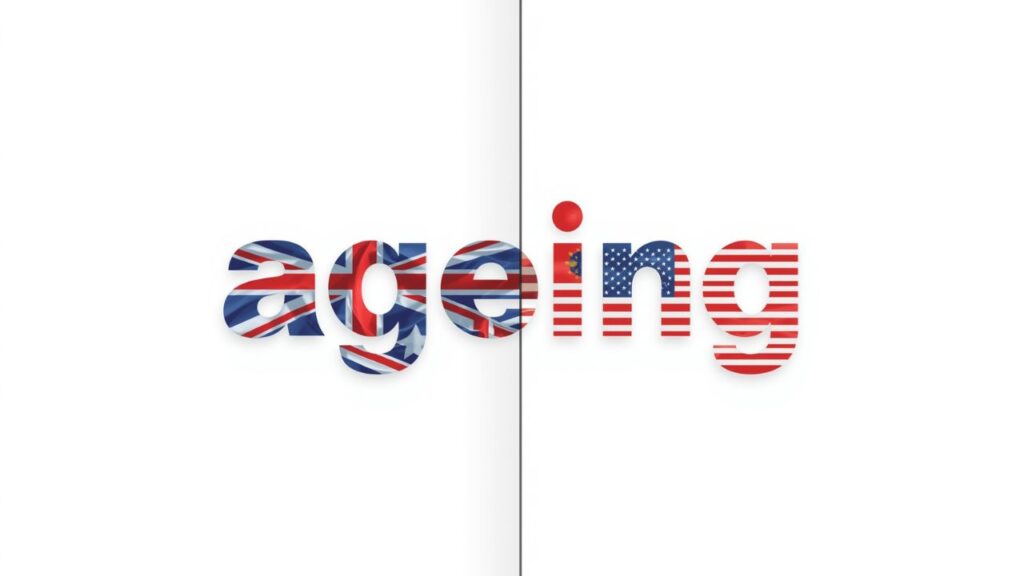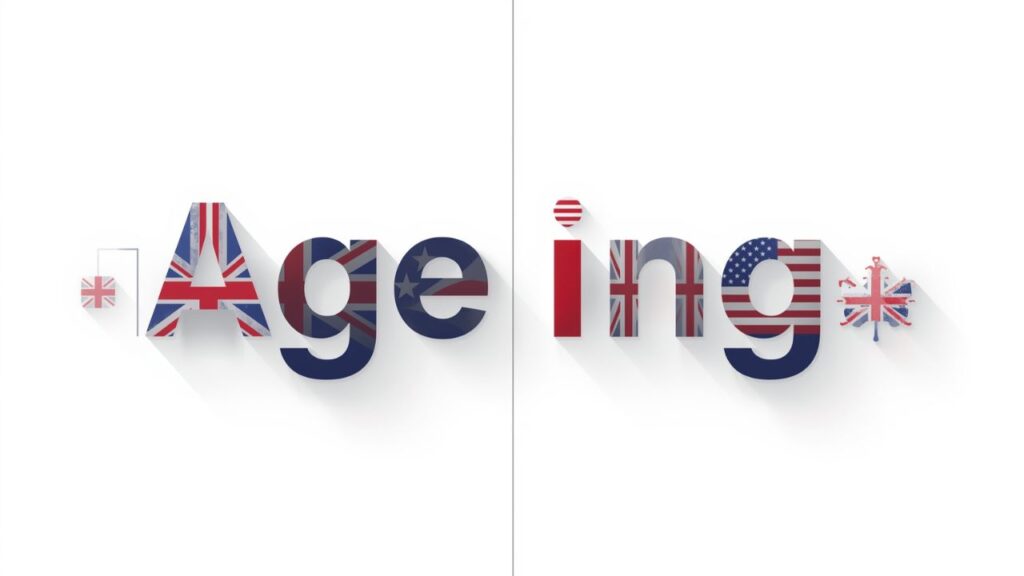The words ageing or aging mean the same thing. They show the process of getting old. The spelling ageing is used in British English, and aging is used in American English.
When you write ageing or aging, you must choose the right spelling. People in the United States use aging, while people in the United Kingdom use ageing more often.
Writers use ageing or aging to talk about people, animals, or even things like buildings. Both spellings are correct, but the choice depends on the country and language style.
Why Do People Get Confused About Ageing or Aging
Many people mix up ageing or aging because the spellings look almost the same. The difference comes from regions. Ageing is British English, while aging belongs to American English.
Writers often face mistakes with ageing or aging when following style rules. Editors in the United States prefer aging, while British publishers and schools usually prefer ageing in their writing.
What Do Ageing and Aging Mean

The words ageing and aging mean the process of becoming older. They can describe people, animals, or even objects. Both spellings share the same meaning in different forms of English.
When we say ageing and aging, the idea is about growing old with time. It may show changes in the body, mind, or things like ageing buildings and aging machines.
Read More : Plurals of Ox and Fox Explained: Oxen vs Foxes in English
How to Use Ageing and Aging Correctly
Writers use ageing and aging based on the country. In the United States, the correct spelling is aging, but in the United Kingdom, people mostly write ageing.
It is important to stay consistent when using ageing and aging. A book, article, or paper should not mix both spellings. Choose one form and follow the same style.
Examples of Ageing and Aging in Sentences
| English Type | Example Sentence |
|---|---|
| British English (Ageing) | The ageing population creates new challenges for schools and hospitals. |
| British English (Ageing) | Scientists study how the brain changes during ageing. |
| British English (Ageing) | Our ageing roads and bridges need repair soon. |
| American English (Aging) | The aging population in the US is growing very fast. |
| American English (Aging) | Doctors research ways to slow the aging process. |
| American English (Aging) | Many cities are struggling with aging buildings and transport systems. |
British English (Ageing)
The ageing population increases the need for better healthcare services.
Researchers explore the effects of ageing on memory and learning.
Many towns face issues with ageing buildings and public transport.
American English (Aging)
The aging population in the US is growing very quickly.
Doctors study treatments to slow the aging process.
Cities must repair aging bridges, roads, and public systems.
Synonyms for Ageing and Aging
| Synonym | Usage Example |
|---|---|
| Getting older | He is getting older, but he still enjoys playing football. |
| Growing old | Everyone is growing old, and life keeps moving forward. |
| Maturing | The child is maturing into a responsible young adult. |
| Becoming elderly | Many people are becoming elderly and need more care. |
| Senescing (scientific term) | Plants start senescing when their leaves turn yellow and fall. |
Etymology of Ageing and Aging

The words ageing and aging come from the old verb “to age.” This verb has roots in Old French aage and Latin aetas, which both mean life or time.
Over the years, English spelling changed in different regions. That is why ageing and aging developed as two forms. British English kept ageing, while American English used the shorter aging.
Read More : 20 Unique Phrases Instead of Good Luck in Future Endeavors
Tips to Overcome Confusion
Know your audience and use either ageing or aging accordingly.
Follow one style guide and stay consistent in your writing.
Use spelling tools to set British or American English preferences.
Replace ageing or aging with synonyms like maturing or getting older if unsure.
FAQs
Which is correct aging or ageing?
Both spellings are correct. Aging is standard in American English, while ageing is preferred in British English. The choice depends on the country and the style guide you follow.
Is it aging or ageing in Canada?
In Canada, both spellings appear, but aging is more common in publications and formal writing. However, ageing can still be seen in certain contexts influenced by British English.
What is the meaning of ageing?
Ageing means the natural process of getting older. It can describe changes in people, animals, or objects like ageing buildings, ageing roads, or an ageing population in a country.
Is it ageing or aging in Australia?
In Australia, ageing is the usual spelling, following British English. However, aging also appears at times, especially in international research papers and global scientific writing.
Final Thoughts
Both ageing and aging carry the same meaning of growing older. The difference is in spelling. Writers should choose the correct form according to the region and stay consistent throughout their writing.
Understanding the spellings ageing and aging helps avoid mistakes in schoolwork, books, and articles. By using the right form, writing looks clear and professional, making it easier for readers to understand the message.

Grammar made easy with Jasiya – your trusted guide for English grammar rules, writing tips, and clear examples to boost learning, accuracy, and confidence.










